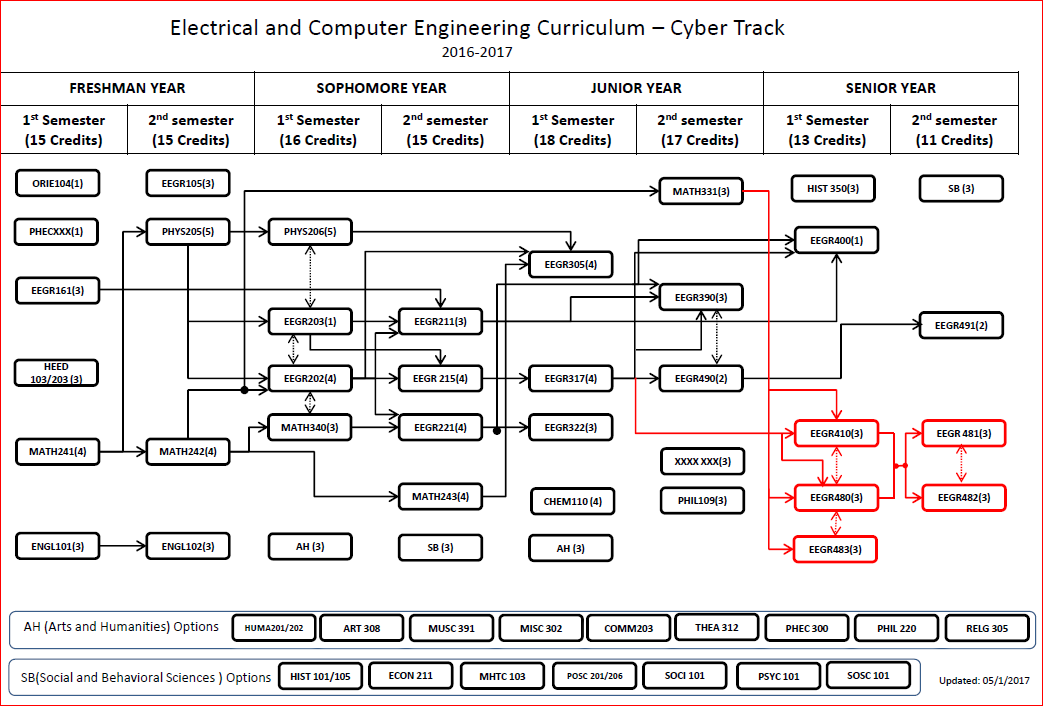In recognition of Morgan State University’s efforts in the advancement of academic program development, research, and preparing students for careers in cybersecurity, the National Security Agency (NSA) and the U.S. Department of Homeland Security (DHS) have designated Morgan State University as a National Center of Academic Excellence in Cybersecurity (NCAE-C). This designation is a significant achievement for Morgan. In the Electrical and Computer Engineering Department, we are proud to stand up effort in collaboration with the Computer Science and Information Science departments.
To meet the requirements of the designation process, an extensive set of Knowledge Units provided by the Information Assurance education experts from NSA and DHS are correlated to (5) ECE senior elective courses to establish the Electrical Engineering Cybersecurity Track. Students receive an NCAE-C certificate upon completion.
Electrical Engineering Cybersecurity Track Courses
Undergraduate ECE students must complete the following courses for this certification:
EEGR 410: COMMUNICATIONS NETWORKS
EEGR 480: INTRODUCTION TO CYBERSECURITY
EEGR 481: INTRODUCTION TO NETWORK SECURITY
EEGR 482: INTRODUCTION TO COMMUNICATION SECURITY
EEGR 483: INTRODUCTION TO SECURITY MANAGEMENT
This track is compatible with the ECE curriculum, and students do not have to take extra courses to receive this certificate. These courses satisfy all four Senior Elective courses (12 credits of EEGR4xx) required for the electrical engineering students and one of the two non-EE elective course requirements (3 of 6 credits).
Course Scheduling
A typical curriculum for EE students who want to participate in the program while obtaining their bachelor’s degree would be as follows.
EEGR 410, 480, 483 courses are offered during the Fall semester while EEGR 481 and 482 are offered during the Spring semester. Considering the prerequisite structure of these courses, a suggested schedule for interested ECE students is shown below.

Please direct inquires to Kevin.Kornegay@morgan.edu
Course Descriptions
EEGR 410 COMMUNICATIONS NETWORKS (Syllabus)
Three hours lecture; 3 credits. An introduction to communication networks. The OSI layering model of networks emphasizes the physical, data link, and network layers; and network topologies. Introduction to various computer, satellite, and local-area communication networks, including Ethernet, Internet, packet radio, and the telephone network.
EEGR480 INTRODUCTION TO CYBERSECURITY (Syllabus)
Three hours lecture; 3 credits. This course will provide a basic introduction to all aspects of cyber-security, including business, policy and procedures, communications security, network security, security management, legal issues, political issues, and technical issues. This serves as the introduction to the cybersecurity program. Prerequisite: EEGR 317. Students must pass EEGR 317 with a grade of “C” or better.
EEGR481 INTRODUCTION TO NETWORK SECURITY (Syllabus)
Three hours lecture; 3 credits. This course will provide the basic concepts in the many aspects of security associated with today’s modern computer networks, including local area networks and the internet. It includes the fundamentals of network architecture, vulnerabilities, and security mechanisms, including firewalls, guards, intrusion detection, access control, malware scanners, and biometrics. Prerequisite: EEGR 317. Students must pass EEGR 317 with a grade of “C” or better.
EEGR482 INTRODUCTION TO CRYPTOGRAPHY (Syllabus)
Three hours lecture; 3 credits. This course will provide practical knowledge of a wide range of cryptography mechanisms and explore their relationship with today’s modern communications and networks. It includes the fundamentals of cryptography, classic and modern encryption, decryption, public and private key structures, digital signature, and secure hash functions. Prerequisite: EEGR 317. Students must pass EEGR 317 with a grade of “C” or better.
EEGR483 INTRODUCTION TO SECURITY MANAGEMENT (Syllabus)
Three hours lecture; 3 credits. This course will provide a basic background in the many aspects of security management associated with today’s modern communications and networks. It includes the fundamentals of Risk Analysis, Risk Management, Security Policy, Security Operations, Legal issues, Business issues, and Secure Systems Development. Prerequisite: EEGR 317. Students must pass EEGR 317 with a grade of “C” or better. SYLLABUS
Please see the School of Engineering Catalog for more details.
